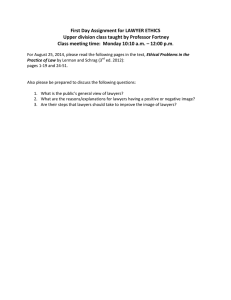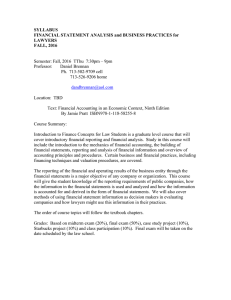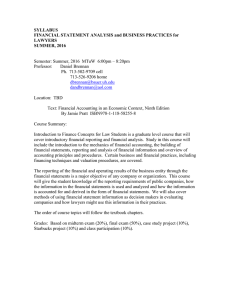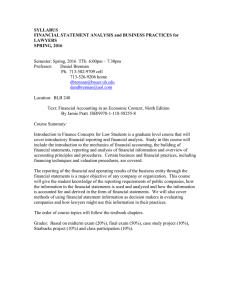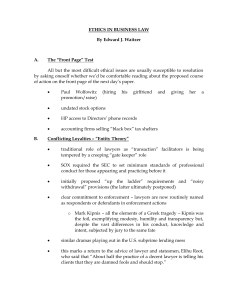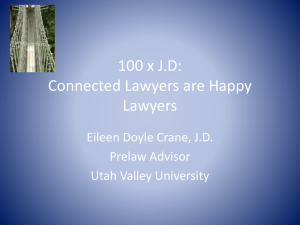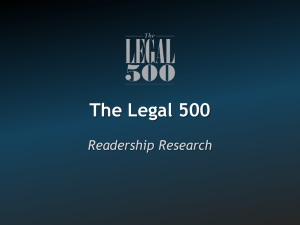Akkermans, Monash - Impact of lawyers-client interactions.ppt (1.659Mb)
advertisement
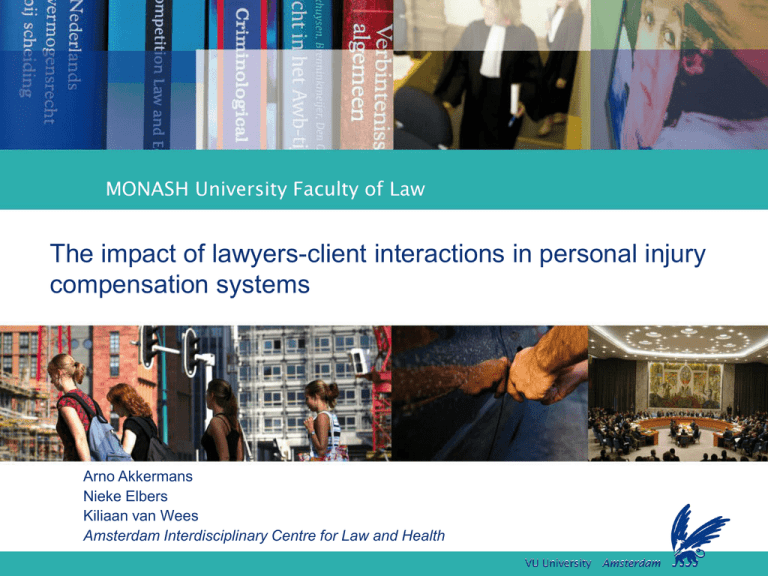
The impact of lawyers on recovery of injury MONASH University Faculty of Law The impact of lawyers-client interactions in personal injury compensation systems Arno Akkermans Nieke Elbers Kiliaan van Wees Amsterdam Interdisciplinary Centre for Law and Health The impact of lawyers on recovery of injury Presentation outline • • • • • • • • • The compensation process causes unintentional harm Qualitative and quantitative data Explanatory theories and possible anti-therapeutic factors Implications. Model of relevant factors Focus on victim’s lawyer. Fundamental shortcoming of lawyers Theoretical frameworks for improving lawyer-client interaction Investigating lawyer-client interaction from the victim’s perspective Results from a small qualitative study in the Netherlands Five important lawyer characteristics. Discussion The impact of lawyers on recovery of injury ‘Compensation is bad for health’ Patients Slachtoffers Welzijn en Recovery herstel Patients receiving Slachtoffers in een letselschadeafwikkeling compensation 0 Time Tijd The impact of lawyers on recovery of injury Qualitative studies: the experience of PI victims • Complex interaction between personal-, health care-, workplace- and compensation systems obstructs recovery and return to work • Claims and settlement process particularly frustrating • The more adversarial, the more aggravating • Power imbalance and stigmatization • Dependency on legal representative assisting with claims process The impact of lawyers on recovery of injury Qualitative studies: the experience of PI victims • Sense of entitlement and injustice • Need for ‘acknowledgment’ and other non-pecuniary needs • Perceived lack of trust about having to prove an injury or disability • Strong dislike of medico-legal assessments • Inability to move on with life during the claims process • It takes too long ! The impact of lawyers on recovery of injury Quantitative studies • Poorer health and vocational outcomes of all kinds of injury • E.g. meta-analysis of outcomes after surgery of 211 studies: odds of unsatisfactory outcome 3.79 time higher (Harris et al. 2005) • ‘Compensation’ often found to be the strongest predictor of poor health outcomes • ‘Compensation’ a significant predictor of health care utilisation (e.g. Harris et al. 2009) The impact of lawyers on recovery of injury Quantitative studies • Long term outcomes (functional outcome, return to work) up to 2 times worse (Gabbe et al. 2007) • ‘Lawyer involvement’ strong predictor of longer duration, poor outcomes, higher costs and health care utilisation (injury severity controlled for) (e.g. Bernacki & Tao, 2008) • Legislative change can have significant impact on health outcomes (Cameron et al 2008, Cassidy et al. 2000) Caveat: although the weight of the evidence points clearly in the same direction, not all studies find these effects, almost all are observational, their quality and evidential power varies (e.g. Grant & Studdert, 2010), more research is needed, and in particular: more sophisticated designs. The impact of lawyers on recovery of injury Explanatory theories • Secondary Gain Being involved in compensation creates a (generally unconscious) incentive to remain unwell • Secondary Victimisation Being involved in compensation is a stressful and aggravating experience, giving rise to renewed victimisation • These two theories refer to overlapping phenomena The impact of lawyers on recovery of injury Possible anti-therapeutic factors • Focus on financial compensation vs rehabilitation and re-integration • Necessity of asserting eligibility => increased perception of symptoms • Adversarial interactions => power imbalance, experience of injustice, loss of sense of control • Medical assessments => promotion of sickness behaviour, identification with diagnoses, repetition of message of inability The impact of lawyers on recovery of injury Possible anti-therapeutic factors • Creation of focus on impairment and past, vs on abilities and future • Complexity of interactions => dependency on others, loss of sense of control, demoralization, loss of ability to cope • Negative experience of treatment by other party (impersonal, mistrust, disrespect, cynicism) => indignation, digging in, demoralization about getting well • Unresolved sense of injustice => anger, frustration, demoralization • Delay => habituation of all these negative factors The impact of lawyers on recovery of injury Implications at all levels, and for all parties Public perception (‘culture’) • Check the immense disempowerment of stigmatization Compensation system design • • • • • Probably the more adversarial, the more anti-therapeutic Although adversarial confrontations can also be psychologically beneficial, especially when someone’s fault caused the initial injury Even tort law procedure has some potential for addressing non-pecuniary needs Lump sum vs periodic payments, non-economic loss in- or excluded The importance of tempo can probably be hardly overestimated Improvements within given system The impact of lawyers on recovery of injury Factors that can influence well-being of PI victims The impact of lawyers on recovery of injury Why focus on the victim’s lawyer? • Victim’s lawyers perceive themselves as ‘the good guys’ => relatively unreceptive to inconvenient truth that they share responsibility for a harm causing system • Victim’s lawyers have: - direct relationship of trust with their clients - direct influence regarding adequate communication, information, client involvement and expectation management - ample opportunities to steer events and take initiatives => within given system, victim’s lawyers are often more in a position to ‘make the difference’ than any other party The impact of lawyers on recovery of injury Fundamental shortcoming of lawyers in PI process: Lawyers focus solely or primarily on financial •outcome Implicit encouragement of disability and sickness behaviour (where applicable, contingency fees even create direct conflict of interest with •client) Prioritizing as a matter of course of steps beneficial to financial recovery yet detrimental to health and reintegration (e.g. medical assessments, any tactic involving delay and stagnation) • Neglect of non-pecuniary needs. Attorneys “often treat what plaintiffs describe as their aims as something ephemeral, and regularly urge clients not to pursue such goals as emotional or moral vindication” (Relis 2007) • “Lose perspective of the whole person who is their client” (Schatman 2009) The impact of lawyers on recovery of injury Theoretical frameworks for improving lawyerclient interaction • Procedural justice theory (Interactional justice, Informational justice) Perception of justice is more determined by procedural aspects and the way a decision is reached, than by the outcome itself • Therapeutic jurisprudence Study of therapeutic and anti-therapeutic effects of law, legal procedure and roles of legal professionals The impact of lawyers on recovery of injury Procedural justice • Information (explanations need to be reasonable, timely and specific) • Opportunity to tell one’s side of the story • Participation in process • ‘Voice’ • Being treated with dignity and respect The impact of lawyers on recovery of injury Therapeutic jurisprudence • Aiming to enhance clients’ internal, psychological, emotional, moral, relational, and spiritual state during legal procedure • Lawyers should not only look at ‘legal soft spots’ (areas that can lead to future legal trouble) but should also consider ‘psycho-legal soft spots’ (areas in which legal interventions or procedures may lead to anxiety, distress, depression, hard and hurt feelings, etc.) • Teaching lawyers basic principles of psychology, interpersonal skills, listening, interviewing and counseling techniques and approaches for dealing with emotional issues • ‘Client-centered lawyering’: involving the client in decision making The impact of lawyers on recovery of injury Investigating lawyer-client interaction from the victim’s perspective • Qualitative semi-structured interviews of PI victims • Both satisfied and unsatisfied (switched lawyers) with their lawyer • Saturation reached at n=21 • Analysis in duplicate through open- axial- and selective coding The impact of lawyers on recovery of injury Context: PI compensation in the Netherlands • Pop. 16,5 mil. Land 33,883 km2 • 487 inh. per km2 – one of the most densely populated countries in Europe • General health insurance • Hybrid system of PI compensation • Level of protection of no fault system quite limited in various ways • Tort system always amounts to a very substantive addition of compensation; • and often constitutes the only source of compensation (e.g. non-employees, other loss than loss of income) The impact of lawyers on recovery of injury Results: 5 important lawyer characteristics 1. Communication 2. Empathy 3. Decisiveness 4. Independence 5. Expertise 1 & 2 correspond with aspects discussed in literature 3 - 5 had only marginally been addressed in literature The impact of lawyers on recovery of injury Communication (Includes ‘information’ and ‘involvement’) Positive: • Being listened to, taken seriously, responding to issues client has put forward • Information about what was going to happen and what to expect Negative: • Communication one-sided, comments ignored • Being left in the dark, not having a step-by-step overview Clear preference for face-to-face contact Forwarded letters should be accompanied by explanation Even when nothing was happening, a call once in two months was considered proper frequency of contact The impact of lawyers on recovery of injury Empathy (Includes ‘respect’ and ‘dignity’) • Participants used words such as compassionate, understanding, interested, involved, human, accessible, personal, friendly and nice • Appreciated being treated as a human beings rather than just a number, lawyer showing genuine interest, giving the feeling of ‘being there’ for his client, and put the client’s mind at rest • Being acknowledged, understood, taken seriously • Also corrections in feeling of injustice were appreciated The impact of lawyers on recovery of injury Empathy (Includes ‘respect’ and ‘dignity’) Empathy appeared to be more important in the beginning of claims settlement process than later on: “It was a very nice person, so I always felt very comfortable. When I look at my new lawyer, then the first lawyer was very humane. At that time I wasn’t ready for a businesslike person, now I am. I think that I’m ready for it now, because he [i.e. first lawyer] has been there. At that time, I got plenty of space. I could tell my story, which was very pleasant” The impact of lawyers on recovery of injury Empathy (Includes ‘respect’ and ‘dignity’) Participants did not expect lawyers to be psychologists Some participants had psychological problems as a result of the accident, injury and/or claims settlement, but they did not expect the lawyer to help them with psychological problems For psychological help, they went to a social worker, psychologist, rehabilitation centre, or a victim support organization The impact of lawyers on recovery of injury Decisiveness Interviewees valued an active, decisive lawyer, so that they could part with their claim, being confident that their interests were represented Many participants were burdened by the fact that they had to keep their lawyer on his toes For several participants, lack of decisiveness was the reason that their case stagnated for an unacceptably long time. For some of them, lack of decisiveness was a reason to switch lawyer Some lawyers were not only passive, the even put (too) much work in the client’s hands The impact of lawyers on recovery of injury Decisiveness Some complained that their lawyer was only active in sending bills: “He was a money-grabber. (...) He was a profiteer that did little or nothing. (…) [The lawyer] asked whether the letters that I wrote in response to the letters of <the insurance company> could be forwarded in entirety, because they were satisfactory and were good enough. In the beginning, it felt like an honour of course. Meanwhile, I thought he was building a case, but he was doing nothing. He only sent the letters back and forth and billed his hours on this.” “They just want money, money, money (...) You became a source of income for the lawyer, and they don’t like to lose that. They take the longest road and not the shortest road.” The impact of lawyers on recovery of injury Decisiveness However, when it came to the actual settlement of the claim, some participants were of the opinion that their lawyer acted too decisively A couple of participants grew suspicious when their lawyer advised to accept the compensation offer, which seemed to be caused by a lack of information or communication The impact of lawyers on recovery of injury Independence Lawyers who seemed to be too friendly and even ‘dependent’ upon the insurance company, were an important source of frustration [up to 98% of all personal injury cases are settled out of court, and PI lawyers are repeat players in negotiations with the same insurance companies] Some participants were very enraged that their lawyer did not want to ‘rub up the insurance company in the wrong way’. They found that their lawyer did not put himself enough in the service of the client The impact of lawyers on recovery of injury Independence “(…) he was not willing to really tackle the opposite party. The lawyers probably think that if they sacrifice one case, then they can win a few others. For the client, this is impossible, of course. I have nothing to do with what he does with other cases. I am dealing with my own case. (...) He [i.e. the lawyer] encounters the opposite party in many other cases of course, and he didn’t want to cast a cloud upon the relationship and contacts with the opposite party.” The impact of lawyers on recovery of injury Independence “I cannot prove it, but I am one-hundred percent sure that an agreement was already been made between <lawyer> and <the insurance company>. That was obvious. An agreement had just been made: ‘we will go for that amount, and that’s done.’ That is being told to me on the phone, literally. ‘Otherwise, it will take very long.’ (...) The interests of the insurance company were taken care of. They wanted to pay as little as possible, so that both insurers could hold money in the pockets. One time <the lawyer> helps <the insurance company> and the other time they help in reverse. As simple as that. It was as plain as a pikestaff. Therefore, I am not prepared to settle anymore. (...) The whole personal injury is one big boil of corruption. It’s a big corrupt nightmare.” The impact of lawyers on recovery of injury Expertise Experience as a lawyer in general or as a PI lawyer in specific was found to be a topic of discussion A client who's lawyer had failed to explain what costs were taken into account in the calculation of the compensation, had lost his confidence in his lawyer’s expertise Some participants noted that their lawyer did not have enough legal experience and organizational skills to bring the claims settlement to a successful conclusion The impact of lawyers on recovery of injury Expertise “Every time, I got lawyers who had just graduated. That’s no advantage, because it means that they have to consult a lot with other lawyers who are already seasoned. That costs a lot of money because all those consultations have all been charged. A lawyer goes on maternity leave and then you get another lawyer, again one straight from university” The impact of lawyers on recovery of injury Expertise “He surprised us one day before the trial. He said that the court might say something about rehabilitation. ‘That is our weakness,’ he said. Then I thought to myself: why did not you say that earlier? Then maybe we could have worked on that. No, we heard one day in advance that this is the case. We did not stand a chance of course.” The impact of lawyers on recovery of injury Expertise Accuracy was also an element on which lawyers were judged whether they were capable lawyers or not Some participants lost the confidence that the lawyer was able to settle the case, because the lawyer was a ‘terrible scatterbrain’ who made an ‘incredible mess’ of his paperwork, or because the lawyer made careless mistakes in the correspondence The impact of lawyers on recovery of injury Expertise “Same letters with different dates. What’s that? Then you get a bit annoyed. (...) At some point, we lost confidence. We were not really taken seriously in that respect. (...) The calculations he had made, we really thought: how dare you! Even I can see that it is wrong. Then I am ashamed.” The impact of lawyers on recovery of injury Discussion • Communication: also mode (face-to-face) and frequency are important • Involvement: some do not want to be involved to much, but prefer the lawyer to be in control => involving should be tailor-made • Empathy: appears to be more important in the beginning of claims settlement process than later on. Probably: - victims are psychologically vulnerable especially in the first months after the accident, a period in which they need practical help, information and support, and they want to talk about their experience in an attempt to reconstruct the event and to regain a sense of control - some victims first need to recover from the psychological and physical trauma before they will be able to cope with the claim settlement process The impact of lawyers on recovery of injury Discussion • Decisiveness: fact that decisiveness has not been mentioned in literature seems remarkable. Long duration is one of the largest burdens. According to participants, the lawyer can contribute significantly in delaying or progressing the compensation process • Enhancing decisiveness and better communication about what is going on and time frames, seem to be important strategies • Independence: has hardly been discussed in lawyer-client literature, yet was of significant importance to participants. Lawyers should find convincing ways to deal with this issue The impact of lawyers on recovery of injury Discussion • Expertise: surprising finding. • Never discussed in lawyer-client literature, and we did not expect that clients would be able to estimate legal skills of their lawyer • Through aspects like accuracy, explanation and decisiveness, some clients were able to get what appeared to be quite an accurate picture of the expertise of their lawyer • Perceived expertise strongly influenced client satisfaction The impact of lawyers on recovery of injury Discussion • Modest study confirming existing theories and finding new points of interest for attention in the domain of client-centered lawyering • Limited generalizability: adversarial tort system, traffic accidents • Relevant for legal education, skill training, lawyer evaluation mechanisms, PR efforts of PI lawyers (e.g. “get the maximum award”) The impact of lawyers on recovery of injury Discussion • Further research: use of established doctor-patient research methods to gain similar insights in patient satisfaction, recall of information, compliance to advice, quality of life, and of health, develop models of empathic communication and construct a reliable measure of quality of care • Client-empowerment. So far, interventions for enhancing lawyer-client relationship have focussed on the lawyer. Interventions could also be focussed on the client. Empowerment interventions, increasingly via the Internet (‘e-Health’) are found to enhance self efficacy and mastery, improve knowledge and behavioural outcomes, reduce health problems, and diminish depression and anxiety The impact of lawyers on recovery of injury Study results are to be published: Nieke A. Elbers, Kiliaan A.P.C. van Wees, Arno J. Akkermans, Pim Cuijpers, David J. Bruinvels, Exploring Lawyer-Client Interaction: Towards Improving Well-being of Personal Injury Victims (submitted) Nieke A. Elbers, Liesbeth Hulst, Pim Cuijpers, Arno J. Akkermans, David J. Bruinvels, Do Compensation Processes Impair Mental Health? A Meta-Analysis (submitted)
